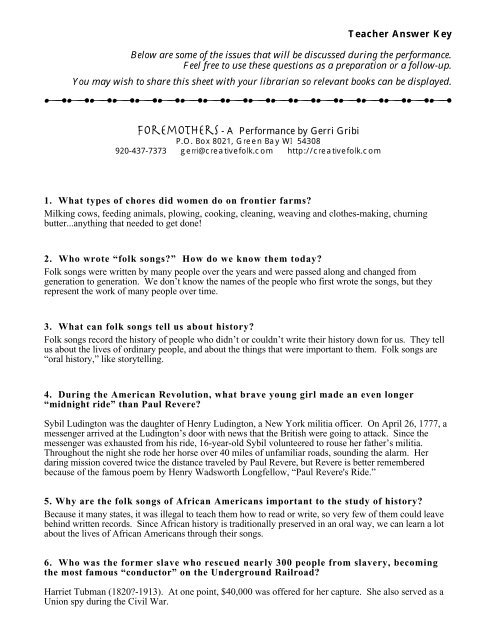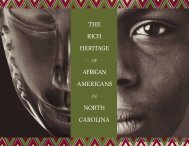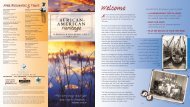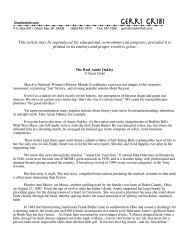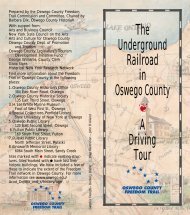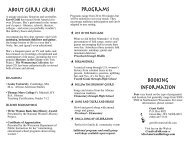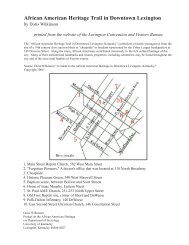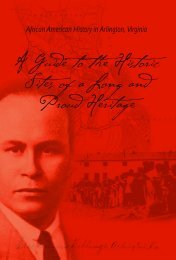Teacher Answer Key (PDF) - Gerri Gribi
Teacher Answer Key (PDF) - Gerri Gribi
Teacher Answer Key (PDF) - Gerri Gribi
You also want an ePaper? Increase the reach of your titles
YUMPU automatically turns print PDFs into web optimized ePapers that Google loves.
<strong>Teacher</strong> <strong>Answer</strong> <strong>Key</strong><br />
Below are some of the issues that will be discussed during the performance.<br />
Feel free to use these questions as a preparation or a follow-up.<br />
You may wish to share this sheet with your librarian so relevant books can be displayed.<br />
- A Performance by <strong>Gerri</strong> <strong>Gribi</strong><br />
P.O. Box 8021, Green Bay WI 54308<br />
920-437-7373 gerri@creativefolk.com http://creativefolk.com<br />
1. What types of chores did women do on frontier farms?<br />
Milking cows, feeding animals, plowing, cooking, cleaning, weaving and clothes-making, churning<br />
butter...anything that needed to get done!<br />
2. Who wrote “folk songs?” How do we know them today?<br />
Folk songs were written by many people over the years and were passed along and changed from<br />
generation to generation. We don’t know the names of the people who first wrote the songs, but they<br />
represent the work of many people over time.<br />
3. What can folk songs tell us about history?<br />
Folk songs record the history of people who didn’t or couldn’t write their history down for us. They tell<br />
us about the lives of ordinary people, and about the things that were important to them. Folk songs are<br />
“oral history,” like storytelling.<br />
4. During the American Revolution, what brave young girl made an even longer<br />
“midnight ride” than Paul Revere?<br />
Sybil Ludington was the daughter of Henry Ludington, a New York militia officer. On April 26, 1777, a<br />
messenger arrived at the Ludington’s door with news that the British were going to attack. Since the<br />
messenger was exhausted from his ride, 16-year-old Sybil volunteered to rouse her father’s militia.<br />
Throughout the night she rode her horse over 40 miles of unfamiliar roads, sounding the alarm. Her<br />
daring mission covered twice the distance traveled by Paul Revere, but Revere is better remembered<br />
because of the famous poem by Henry Wadsworth Longfellow, “Paul Revere's Ride.”<br />
5. Why are the folk songs of African Americans important to the study of history?<br />
Because it many states, it was illegal to teach them how to read or write, so very few of them could leave<br />
behind written records. Since African history is traditionally preserved in an oral way, we can learn a lot<br />
about the lives of African Americans through their songs.<br />
6. Who was the former slave who rescued nearly 300 people from slavery, becoming<br />
the most famous “conductor” on the Underground Railroad?<br />
Harriet Tubman (1820?-1913). At one point, $40,000 was offered for her capture. She also served as a<br />
Union spy during the Civil War.
7. Why would a woman want a traditionally “male” job as a soldier or sailor?<br />
There are many reasons. Perhaps because she was patriotic, and wanted to serve her country. Or,<br />
because men’s jobs paid much more money than women’s. Or just for the adventure and excitement.<br />
Basically, a woman would want a “male” job for all the same reasons a man would want it!<br />
8. How might she go about getting such a job?<br />
Some, like Deborah Sampson, disguised themselves as men.<br />
9. What amendment gave women the right to vote, and in what year?<br />
The Nineteenth Amendment, passed August 26, 1920<br />
10. How long did women have to fight to gain this right?<br />
72 years. The first written demand for women’s suffrage was in 1848, at the first Women’s Rights<br />
Convention held in Seneca Falls, NY. Many viewed it as a continuation of the American Revolution: that<br />
no person should be taxed without being represented.<br />
11. Who were some of our famous foremothers who lead this revolution?<br />
Susan B Anthony, Elizabeth Cady Stanton, Lucretia Mott, Sojourner Truth, Alice Paul and Carrie<br />
Chapman Catt are just a few names among many.


